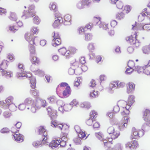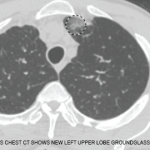The investigators could not explain why only half of the patients achieved remission. Moreover, even after remission, some participants in the mepolizumab group experienced relapse during treatment, with an annualized relapse rate of 1.14 in the mepolizumab group and 2.27 in the placebo group. These results raise the hope that it may be possible to identify biomarkers that can be used to select patients who are most likely to benefit from treatment with mepolizumab. Although not all patients treated with mepolizumab achieved remission, the investigators highlighted an important benefit of the mepolizumab treatment: 18% of patients were able to completely discontinue prednisone. Additionally, 44% of patients in the mepolizumab group had an average daily dose of prednisone ≤4.0 mg, whereas the same was true for only 7% of patients in the placebo group.
Lara C. Pullen, PhD, is a medical writer based in the Chicago area.
Reference
- Wechsler ME, Akuthota P, Jayne D, et al. Mepolizumab or placebo for eosinophilic granulomatosis with polyangiitis. N Engl J Med. 2017 May 18;376(20):1921–1932. doi: 10.1056/NEJMoa1702079.



